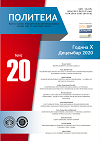Obezbeđenje primene prava Evropske unije u državama članicama: Slučaj vladavine prava u Poljskoj
Enforcement of the EU Law in Member States: Case of the Rule of Law in Poland
Author(s): Boris TučićSubject(s): International Law, Government/Political systems, International relations/trade, Politics and law, EU-Legislation
Published by: Fakultet političkih nauka Univerziteta u Banjoj Luci
Keywords: EU law; Poland; the rule of law; EU members; international law;
Summary/Abstract: The subject of the paper is a six-year dispute between Poland and the European Union (EU) related to a systemic crisis in the field of the rule of law in this member state and the instruments the EU and some other relevant international political and legal authorities such as the Council of Europe used in order to overcome this challenging situation, as well as the results achieved to date. Considering their nature, the instruments used in this matter are generally divided into two categories. On the one hand, there are political instruments, such as the Rule of Law Framework, established in 2014 by the European Commission, or the procedure of the implementation of political sanctions against a member state defined in Article 7 of the EU Treaty. On the other hand, there are judicial instruments managed primarily by the European Commission and the Court of Justice of the European Union, among which the infringement procedure from Article 258 of the Treaty of Functioning of the European Union holds the central position. The analysis shows that none or very little progress has been achieved until now, and that the effects of the EU`s bureaucratic manner of managing the crisis have been counter-productive, only provoking a more explicit involvement of the Constitutional Court of Poland, as a “heavy player”, into this dispute. At this moment, it seems that both sides faced the wall and that everyone is staring into the Constitutional Court expecting the magic formula out of it, according to which the fundamental EU criteria in the field of the rule of law would be met with zero or minimum political damage made to the Polish ruling political subjects. In our opinion, the aforementioned implies that a possible way out of the conflict must be sought in the sphere of political negotiations and diplomacy and not in rigid but ineffective legal or judicial procedures.
Journal: Politeia - Naučni časopis Fakulteta političkih nauka u Banjoj Luci za društvena pitanja
- Issue Year: 11/2021
- Issue No: 22
- Page Range: 69-81
- Page Count: 13
- Language: Serbian

